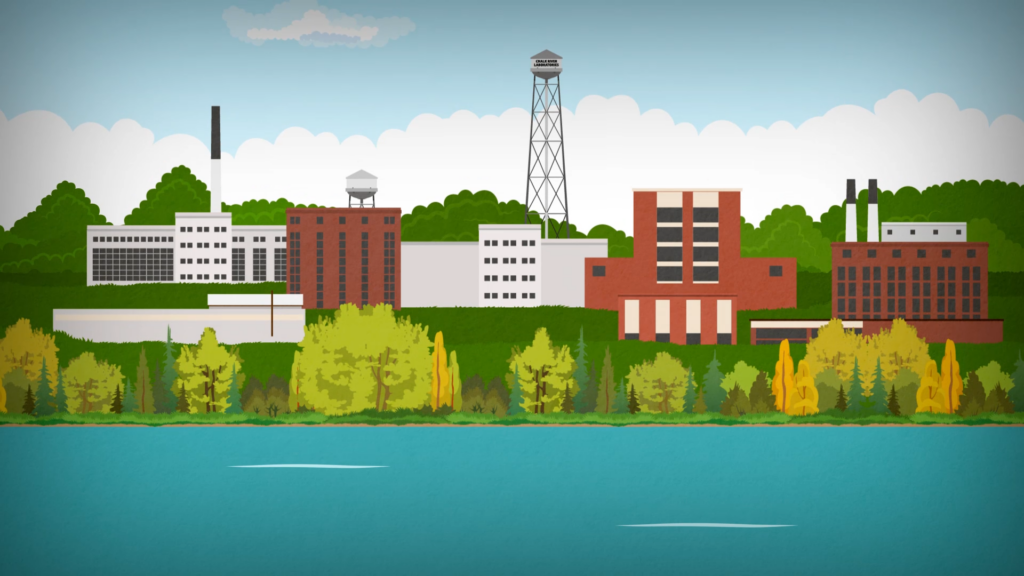Ottawa Riverkeeper is an OLW member organization that acts as a “champion and collective voice for the Ottawa River watershed.” This piece, written by Matthew Brocklehurst (Communications Manager) and Larissa Holman (Director of Science and Policy), showcases the organization’s freshwater advocacy on a specific issue.
Nuclear Waste presents a unique challenge for freshwater policy and protection. Not only is it a potent threat to the health of ecosystems, watersheds, and human communities, but it is a deeply complex issue. Technical knowledge is required, and multiple overlapping jurisdictions need to be juggled. This is not the place for lax or unclear regulation.
And yet, Canada’s policies for Radioactive Waste Management are severely lacking. Long term storage policies exist for fuel-related waste, although much of this waste still remains in temporary storage. Crucially, most non-fuel radioactive wastes do not have any permanent storage plans. This leaves a problematic regulatory gap, which Ottawa Riverkeeper came to realize after having worked on the issue of nuclear waste at Chalk River since 2006 as part of the site’s Environmental Stewardship Council.
After working to understand the repercussions of this lack of radioactive waste policy, Ottawa Riverkeeper and fellow advocacy groups set out to bring attention to how this waste was being handled. In November 2020 Natural Resources Canada launched a review of the current policy as a result of these efforts. The review included an extensive consultation period, through which Ottawa Riverkeeper formally submitted 15 recommendations for a much stronger nuclear waste policy in Canada.
The Draft Policy that Natural Resources Canada has produced thus far has been deeply disappointing. The recommendations of many participants in the engagement process, Ottawa Riverkeeper included, were for greater clarity and definitive rules and policies in place to manage this waste. Instead, the Draft Policy for Radioactive Waste Management and Decommissioning, which was released in February 2022, fails to lay out clear definitions, is extremely vague, and seems impossible to enforce. In some places it seems to blatantly contradict the opinions of Canadians engaged with this issue, whose views are evident in the publicly available final report on the engagement process. With no clear objectives, timelines, or proposals on how transparency, consultation, and oversight will be completed, we at Ottawa Riverkeeper are left wondering how this Draft Policy will provide the clarity that people are looking for and regulators require.

Why should water advocacy groups get involved? The answer should be obvious, as highlighted by the development of the Chalk River Facility. Not only has a waste disposal facility been proposed to be located just a few hundred metres from the Ottawa River and upstream of our nation’s capital, but the lack of regulations to fall back on for such a project means that the proponent has largely been responsible for developing the thresholds and monitoring activities that will oversee this site. A more robust policy meant to protect from the impacts of nuclear waste would provide a clearer framework for the regulators to oversee projects such as this one and add needed protections for freshwater environments.
Existing projects are just the beginning; the issue will only become more pressing with time. There have been clear signals that the federal government sees nuclear power as a means of addressing climate change. The latest trend is for Small Modular Reactors and Micro Modular Reactors; these are smaller scale, fully functional nuclear power facilities, designed to be built in small and remote communities to provide emission-free power. However, these facilities still produce radioactive waste, and this waste needs to be adequately addressed.
Canada needs a more robust radioactive waste management policy. As the world continues to grapple with nuclear waste, we have a chance to catch up to our peer nations, and even lead the way in securing the healthy future of our lakes, rivers, and the communities that depend on them.
For more information on Ottawa Riverkeeper’s advocacy, reach out via email.